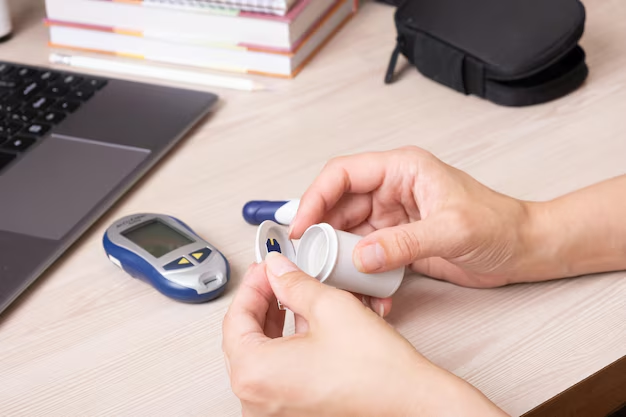Your Guide to How Is Type 2 Diabetes Treated
What You Get:
Free Guide
Free, helpful information about Diabetes FAQ and related How Is Type 2 Diabetes Treated topics.
Helpful Information
Get clear and easy-to-understand details about How Is Type 2 Diabetes Treated topics and resources.
Personalized Offers
Answer a few optional questions to receive offers or information related to Diabetes FAQ. The survey is optional and not required to access your free guide.
Effective Treatments for Type 2 Diabetes: What You Need to Know
Understanding how to treat Type 2 Diabetes is essential for managing this chronic condition successfully. With the right strategy, individuals can live healthier and more fulfilling lives. Type 2 diabetes treatment is a multifaceted approach that involves lifestyle modifications, medication, and ongoing education. Here's a comprehensive look into how Type 2 diabetes is treated and how you can support your healthcare journey with financial help and educational resources.
Lifestyle Changes: The First Line of Defense
Perhaps the most critical step in managing Type 2 diabetes is adopting a healthier lifestyle. Unlike Type 1 diabetes, which primarily requires insulin, Type 2 diabetes management often starts with changes that you can control:
Dietary Adjustments: Consuming a balanced diet rich in whole grains, vegetables, fruits, and lean proteins is crucial. Reducing sugar and refined carbohydrates helps stabilize blood sugar levels. Consulting with a dietitian can offer personalized guidance.
Exercise: Regular physical activity enhances insulin sensitivity, helping cells use blood sugar more effectively. Aim for at least 150 minutes of moderate-intensity aerobic exercise every week. Walking, cycling, and swimming are excellent choices.
Weight Management: Losing even a small percentage of your body weight can significantly improve blood sugar control. Setting realistic goals and tracking your progress supports long-term success.
Medication and Insulin Therapy
When lifestyle changes aren't adequate, medication may be necessary to keep blood sugar levels in check. Common medications include:
Metformin: Often the first drug prescribed, metformin helps reduce glucose production in the liver and improves the body’s sensitivity to insulin.
Sulfonylureas: These increase insulin production by the pancreas.
GLP-1 Receptor Agonists and SGLT2 Inhibitors: These are newer medications that help improve blood sugar levels and can also aid in weight loss.
For some individuals, insulin therapy may become essential, especially if other treatments aren't effective or if pancreatic function declines over time.
Routine Monitoring and Professional Guidance
Regular monitoring of blood sugar levels is a cornerstone of diabetes management. Routine health checks enable timely adjustments to treatments. Self-monitoring with glucose meters and regular A1C blood tests give valuable insights into how well the treatment plan is working.
Collaborating closely with healthcare professionals like endocrinologists, diabetes educators, and nutritionists ensures comprehensive care and keeps you informed about the latest advancements and personalized strategies.
Financial Aid and Resources
The cost of managing diabetes can be daunting, but numerous avenues can ease the financial burden. Here are some helpful resources:
Medicare and Medicaid: They offer coverage options for diabetes screenings, supplies, and medication costs.
Pharmaceutical Assistance Programs: Many drug manufacturers offer assistance programs providing insulin and other diabetes medications at reduced costs.
Nonprofits and Local Community Resources: Organizations like the American Diabetes Association may provide community support and educational resources.
Exploring Educational Opportunities
Empowering yourself with knowledge about diabetes management can lead to better health outcomes. Diabetes self-management education (DSME) programs teach vital skills for day-to-day diabetes care. Check with your healthcare provider about programs available in your area or online courses.
Financial and Educational Resources for Diabetes Management
- 💸 Medicare & Medicaid: Coverage for essential supplies and medications
- 💊 Pharmaceutical Assistance Programs: Discounts on insulin and drugs
- 🏥 Nonprofits & Community Help: Support and education initiatives
- 🎓 Diabetes Self-Management Education (DSME): Learn effective management techniques
- 📚 Online Courses: Enhance your understanding of diabetes care
Armed with the right treatments and resources, managing Type 2 diabetes becomes a less formidable challenge. Take control of your health by leveraging available treatments and seeking financial and educational support to enhance your health journey.
What You Get:
Free Diabetes FAQ Guide
Free, helpful information about How Is Type 2 Diabetes Treated and related resources.

Helpful Information
Get clear, easy-to-understand details about How Is Type 2 Diabetes Treated topics.

Optional Personalized Offers
Answer a few optional questions to see offers or information related to Diabetes FAQ. Participation is not required to get your free guide.


